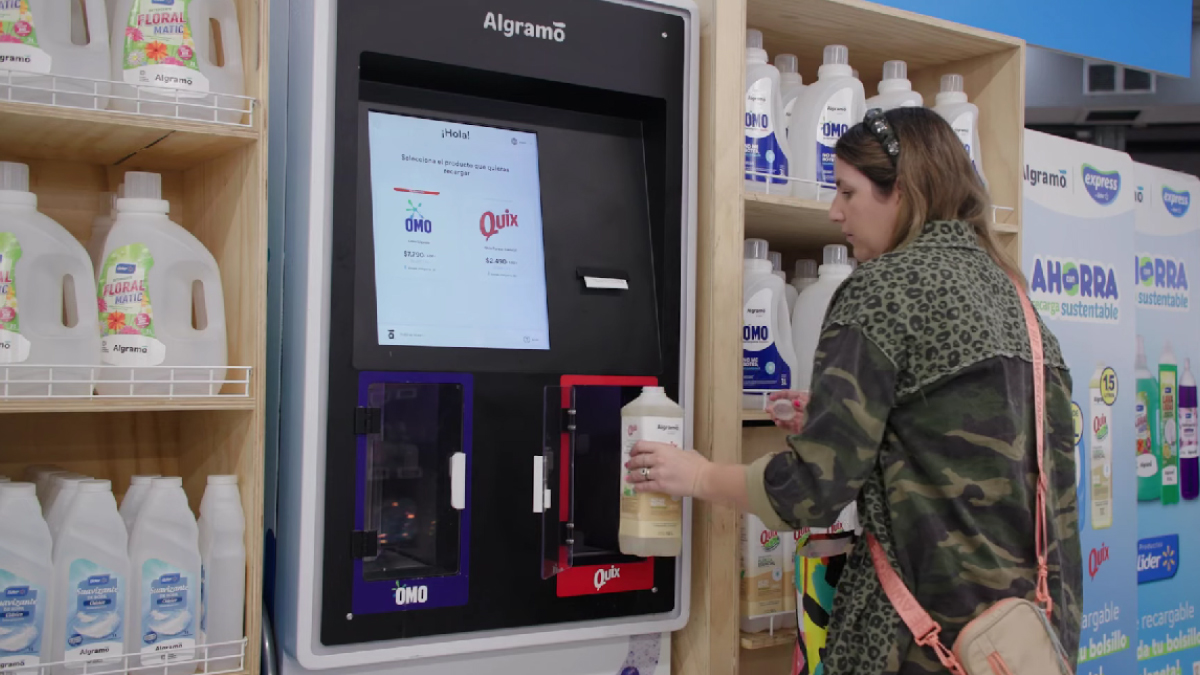Start-ups around the world are leading the charge to reuse and recycle towards a more circular economy. UNCTAD explores best practices and policy options to accelerate this movement.
© UNEP/Duncan Moore | A customer uses an Algramo refilling station in a supermarket in Santiago, Chile.
In a business-as-usual scenario, we would need two planets by 2030 to meet our production and consumption needs.
Entrepreneurs around the globe are driving the shift to a circular economy, from refill stations for daily essentials in Chile to IT waste management solutions in India.
The transition to a circular economy could create more than 7 million jobs and unlock up to $4.5 trillion in economic growth by 2030.
In convenience stores across Chile, customers are bringing reusable containers to fill up on essential products like shampoo, soap and detergent, thanks to refill stations set up by Chilean start-up Algramo, which in Spanish means “by the gram”.
Such services are key to tackling the world’s waste problem, including the reliance on single-use plastic products like bottles and containers.
Each year, cities worldwide produce between 2.1 billion and 2.3 billion tonnes of solid waste. The UN warns that a business-as-usual scenario would require two planets by 2030 to meet global production and consumption needs.
The make-take-waste economy is closely linked to major global challenges, such as climate change, biodiversity loss and the soaring costs of energy. The world needs to urgently transition to a more sustainable, circular model to keep products and materials in circulation as long as possible.
An UNCTAD report, “Entrepreneurs riding the wave of circularity”, spotlights companies like Algramo that are pioneering circular business models, reimagining humanity’s relationship with materials and natural resources.
From technology-driven start-ups to ‘agripreneurs’
The report, the latest edition of UNCTAD’s New Frontier in Entrepreneurship series, highlights circular economy innovations from across regions and sectors.
These include sharing business models like Hello Tractor, which allows small farmers in Africa to share the equipment they need when they need it, and Kabadiwalla Connect, which uses digital and cloud technologies to bridge the gap between informal waste collection and formal waste processing in India.
Also in the spotlight are “agripreneurs” introducing innovative techniques to minimize soil degradation and improve crop yields, helping to improve food security and allow ecosystems to regenerate. For example, start-ups such as Samudra Oceans are using artificial intelligence and robotics to scale up seaweed farming and accelerate carbon sequestration – a process to reduce climate-warming carbon dioxide in the atmosphere.
Unlock $4.5 trillion and create 7 million jobs
The circular economy could create more than 7 million jobs and unlock up to $4.5 trillion in economic growth by 2030.
The report says that key to unlocking this potential is an entrepreneurial ecosystem that supports start-ups and small and medium-sized enterprises as drivers of the circular transformation.
“Entrepreneurs are not just trailblazers. They’re agents of change,” says Arlette Verploegh, who leads UNCTAD’s work on entrepreneurship development. “They introduce new approaches to circular design, product life extension and effective waste management systems at the local level.”
“Their innovative products, services and business models advance circularity, triggering a domino effect throughout communities and along the entire value chain,” Ms Verploegh adds.
A menu of policy options
Through a menu of policy options, the report offers a framework to overcome key challenges hindering circular innovation, especially in developing nations, such as limited access to finance and technology.
It calls for more public and private sector collaboration to identify and tackle industry-specific challenges. The report also advocates for policies that are coherent and complement each other, alongside multistakeholder dialogues to better adapt rules and regulations.
Furthermore, the report stresses the need for facilitating a circular-economy mindset shift through education and public campaigns, as well as knowledge exchange platforms and incubators for entrepreneurs.
Beyond raising awareness, the UNCTAD emphasizes the need to enhance research and development, as well as mobilize finance and mitigate investment risks for circular economy entrepreneurs.
“The report is a call for action,” Ms. Verploegh says. “It urges governments, businesses and the public to recognize the vital role that entrepreneurs play in advancing a circular economy.”

